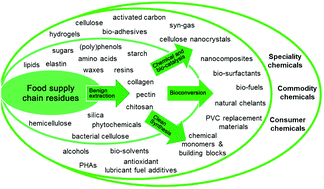Today’s society currently faces two big challenges in the form of resource depletion and waste accumulation. The result of this is increased cost of raw resources and increasingly restrictive and expensive waste disposal.

Clark emphasises throughout the article that it is important to go beyond first generation waste valorisation and so we must try to make use of all the valuable components of the waste. You can see Professor Clark’s recent lecture on this topic on The Reaction website, given at the Chemistry Centre in October.
Read the full article for free until the 4th February 2013!
Food waste biomass: a resource for high-value chemicals, Lucie A. Pfaltzgraff, Mario De bruyn, Emma C. Cooper, Vitaly Budarin and James H. Clark, Green Chem., 2013, DOI: 10.1039/C2GC36978H
Stay up-to-date with the latest news and content in Green Chemistry by registering for our free table of contents alerts.










